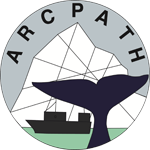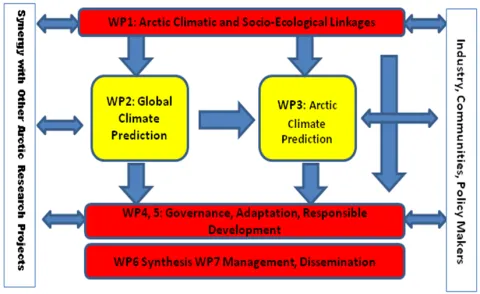Financed by the Joint Nordic Initiative on Arctic Research.
The NordForsk funded Centre of Excellence Arctic Climate Predictions: Pathways to Resilient, Sustainable Societies has as its acronym "ARCPATH" which reflects its focus on the Arctic region and the NordForsk focus on "pathways to sustainability". ARCPATH has integrated results from a variety of very different and traditionally separate academic disciplines. In particular, the project has sought to address the complex and interlinked issues of climate and socio-economic change occurring in the Arctic by focusing on near-term changes, with the overarching goal of producing solid policy-relevant results and fostering responsible and sustainable development. This has required the understanding and reconciliation of environmental, social and economic demands reflecting the adaptive challenges and confounded realities of Nordic Arctic societies facing rapid social, economic and environmental change. While the Arctic region as a whole has been the context for the project, ARCPATH has had a specific focus on communities in Iceland, Greenland and northern Norway. Analyses of changes in both Arctic and global climate have formed a large component of the project and a significant achievement of ARCPATH has been to improve the prediction of climate of the next few years at high latitudes, through the application of state-of-the-art climate models, new initialisation methods, and high-resolution regional climate models. This is to meet the demands of the societies and stakeholders in the ARCPATH focus regions for a more nuanced picture of how rapidly their climate will change up to 2030. Further significant achievements include analyses of impacts of climate on fisheries in the past and the present as well as detailed analyses of the significance of ecosystem services with a particular focus on whale-watching tourism in the project research communities.
The objective of ARCPATH has been to:
- Combine improved regional climate predictions with enhanced understanding of environmental, societal, and economic interactions in order to supply new knowledge on Arctic "pathways to action".
In short,
- ARCPATH builds on, and improve, cross-disciplinary state-of-the-art research in order to provide new insights and novel approaches to responsible development in the Arctic.
General Summary
The ARCPATH project was designed specifically to integrate results derived from a variety of very different and traditionally separate academic disciplines. In particular, the project has sought to address the complex and interlinked issues of climate and socio-economic change occurring in the Arctic by focusing on near-term changes, with the overarching goal of fostering responsible and sustainable development. This has required the reconciliation of environmental, social, and economic demands. ARCPATH methods have involved cutting-edge cross-disciplinary collaboration. The disciplines and knowledge systems include: climatology (global modelling; dynamical downscaling; historical climatology); environmental science (marine and fisheries biology); socio-economic science (fisheries management systems; human eco-dynamics; local and indigenous knowledge; anthropology; economics; and governance systems). In the context of both global and Arctic climate change as well as social-ecological and socio-economic change ARCPATH has focused on developments in local communities in Iceland, Greenland and, to a lesser degree, northern Norway (Malinauskaite et al. 2022)
As noted in the original ARCPATH research proposal, rapid and far-reaching changes in the Arctic will cause global effects but are likely to first and foremost have an impact on Arctic Nordic regions. It is thus essential that Nordic researchers combine their expertise in order to elucidate and understand these changes. ARCPATH has built a Nordic Centre of Excellence based on the long experience of established researchers, leading experts in their fields, as well as including many young scientists who bring fresh insights and who will help to achieve long-term Nordic added value. These goals and achievements have been well established for ARCPATH. Combining the expertise of each ARCPATH institution has facilitated important synergies in knowledge creation, and it has been clear that the research conducted could not have been undertaken by each partner institution on its own. ARCPATH has had great success in the training of young scholars and in terms of Nordic Added Value. The project has also drawn international talent to the Nordic region through international recruitment of senior scholars, post doctoral scholars and PhD students. Outreach has been significant and has included novel endeavours such as the ARCPATH contributions to the documentary films by environmental artist, Elizabeth Ogilvie, Out of Ice and Into the Oceanic. International collaboration has been excellent and is reflected in the numerous publications and presentations by team members working with colleagues within and outside of ARCPATH. This report also summarizes the implementation of project findings and project results in the context of the United Nations Agenda 2030 and the 17 Sustainable Development Goals.
ARCPATH has been organized in seven work packages as illustrated in the diagram below. WP1 seeks to establish Arctic socio-ecological linkages. WP2 and 3 produce improved Arctic and and global climate predictions. WP4 and 5 use the established linkages from WP1, together with the climate predictions from WP2 and 3, to focus on issues regarding risks related to climate change, and what these mean for responsible development in Arctic coastal communities. WP4 and 5 also inform WP2 and 3 in establishing climate-soci-ecological linkages. WP6 draws together syntheses of project conclusions and recommendations. WP7 concerns management.
Reference: Malinauskaite L., Cook, D., Davíðsdóttir, B., Ögmundardóttir, H., Koenigk, T., Karami, M. P. & Krushke, T. 2022. Connecting the dots: an interdisciplinary perspective on climate change effects on whales and whale watching. Ocean and Coastal Management. In Review.

